Pitaji – An unschooled learned man
Category:
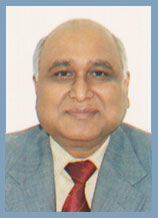
Bal Anand was born in 1943, in a village about 20 km south of Ludhiana, in a family of saint-scholars who practised Ayurveda. Graduated from DAV College, Jalandhar, and did Master in English Literature from Govt. College, Ludhiana. After a stint for a few years as lecturer, joined the Indian Foreign Service. Served in nine different countries and retired as India's High commissioner to New Zealand. Now reading, reflecting and writing in nest in Greater Noida.
He was born, according to an authentic written record in the family, on Monday, August 30, 1920.
He was the Jayeshatha Saputtar - first born - of his parents. The various conversations among the elders of the family, which included my two most loving great-grandfathers and an adorably talkative great grand-aunt, called Bhua Ji by the entire village, often innocently overheard by me as a child of four-five years, had confirmed this to me. They mentioned that his father Dwarka Nand and his grandfather Giata Nand were also the first born of their parents. And So Am I - his son, now 73+ years according to the date of birth in my Matriculation Certificate. And so are our eldest son, Aditya and our six year old grandson, Antariksh!
Pray, don't misread this opening statement in any overtone of machismo or a parade of any gender bias. It is nothing more than a humble mention of the facts of my family tree.
My father was named Har Dayal Nand by his Guru-grandfather Vaidya Bhushan, Kaviraj Pramatma Nand Ji (d. October 19, 1947), a highly renowned scholar and Ayurvedic physician of his era. The name might have been inspired by the popular perception prevailing in those years of Har Dayal (later famous with the prefix ‘Lala', though he was a ‘Mathur'), the legendary scholarly genius with a miraculous memory. According to the lore in the family, Baba Pramatma Nand Ji had also selected my name, even before my birth! That story could wait till the time when I write about myself! This piece of narration is dedicated solely to the sublime, sweet and sour memories of my father, "Shri Haridial Nand alias Haridial Singh Vaid, Ayurved Rattan, Ayurved Manishi, Gold Medallist, Proprietor, Shri Gajnesh Ayurvedic Aushdhalaya, Ahmedgarh."
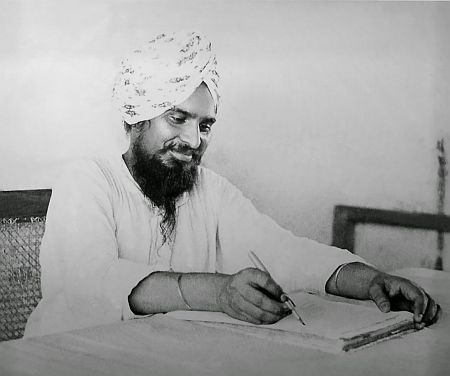
Pita Ji. About 1954.
A uniquely engaging conversationalist with all the old-world wonderful charm of a philosopher-physician, he was destined to fade away, like many extraordinarily gifted persons, including his namesake Har Dayal, in despair and deprivation on April 19, 1978 - at the age of 57 years, 7 months and 19 days! I had sent him my first - and fatefully the last - birthday greetings card from Tehran promising to ‘fulfil all your dreams and expectations of Me!'
I am reminded of the soulful moment in 1955 in my school when he had, pointing at the youthful Deputy Commissioner S. D. Bhambri (I.A.S. 1950) of Sangrur, that, "in independent India now such young persons who are bright in studies and succeed in competitive examinations will the real rulers of the country!" A dream had been planted in my mind and soul!
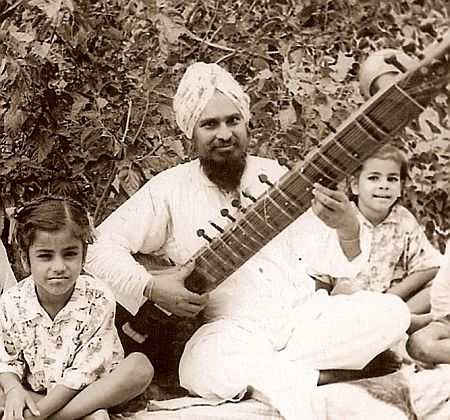
L to R: Channa (Major Charanjit Singh Jagdev), Pita Ji, Jangi (Brigadier Jagjit Singh Jagdev) Children are sons of Pita ji's friend Air Force Official Randhir Singh who had taken this photo. About 1954.
My Father, if he had lived longer, would have been 96 years old (in 2016).
(Ed. Note: This was written in October 2014) I feel uniquely lucky to meet Ambassador V.M.M. Nair (I.C.S. batch of 1942), going fine at 95+ years during the walk-and-talk in our residential complex. Ashwini Kumar (I.P.), the film-hero-type-super-Cop and for many years Mr Hockey of India, is exactly of the age of my father. Kumar is known to be fully alert and moves around actively, though confined to a wheel chair. (Ed. note: Mr. Kumar passed away in October 2015)
I feel convinced that my father had all the ability to qualify for the I.C.S. if the family had the right exposure and guidance to educate him in the British system of education. He was, however, tutored totally at home in all the traditional learning of Sanskrit classics, Ayurveda, Kavya Shastra - Prosody, Sangit Shastra - Musicology interpretative religious studies, including the modern ideologies of Gurmat, Arya Samaj and new wave ideas of Swami Shivananda and Sri Aurobindo. He was trained to be a good horse rider - I remember once riding behind him on a journey to my mother's village - and a champion chess player!
Father was most rigorously trained, in the Gurukul-style dawn to dusk routine, for more than two decades to be a perfect calligrapher in both Gurmukhi and Devanagri scripts. Professor Bachittar Singh (I.R.S.), his 12 years junior beloved nephew who had become the first Post-Graduate in English in the area in 1950, confirmed to me, "Chacha Ji was known to be very bright but was equally naughty too... Baba Ji (Pramatma Nand) used to tie a rope to his one leg so that he did not stray away during the day long lessons!"
No wonder, that no scholar could discern any shade of difference in the ‘pearls-like' handwritings of Guru Pramatma Nand and disciple Har Dayal Nand in the various voluminous works ‘penned' jointly by them!
Well versed in music, Pitaji had become the most sought-after Pathi - reciter - of Granth Sahib - in the far and wide area. The circle of his influential Sikh admirers persuaded him to become an Amritdhari - baptised Sikh - on July 26, 1947. I vaguely remember how he had suddenly stopped sharing hookah with grandfather Giata Nand Ji, and had also adopted an attire of the Sikh tradition.
As per the custom of the time, Father's marriage had been arranged at an age of about twenty years. There is, however, no written reference in the family of the date and year of marriage. The conversations in the family have revealed that my mother, though not formally educated, was a very talented and hardworking lady. She had a great passion for all type of knitting including making the large size carpets and durries, many of which had remained in use for decades since her passing away.
Though I have never been clearly told about it, she is understood to have died sometime in early 1946 due to complications after a delivery. It has been further understood that my father was deeply depressed over her demise and had tried to seek solace for some time wandering in the guise of a sadhu. My grandmother, a deeply pious lady with prayers on her lips all the time, was the most worried soul in the family about the remarriage of her son who had become a widower at the age of less than 26 years. And strangely, at the same time, she would often narrate to me the stories of Dhroon-Dhruv Bhakat, Pooran Bhakat and other noble children who had been maltreated by their stepmothers!
Finally, after many efforts and a go-between role by a highly respected relation, Babu Ji Patram Singh, my father's second marriage was solemnised on March 9, 1953 in the village of Pawala, near Rajpura in a large family of ex-service men.
I must mention that Father had been pushed to take up many responsibilities at a much younger age in the multi-generation joint family because of a long-drawn civil litigation over the properties.
The deaths of the saintly elders - Pramatma Nand ji on Oct 19, 1947 and Giata Nand Ji on August 20, 1951 - altogether altered the circumstances of the khandaan (larger clan). The family had started shifting to Ahmedgarh, initially for the education of my uncle. I also joined the school there in May 1951 in the third grade.
In Ahmedgarh, Father broke one family tradition. He set up a health clinic -Shri Gajnesh Ayurvedic &\; Unani Aushdhalaya. To begin with, this was in partnership with Shri Lal Chand Jai, a friend and registered Hakim of the Unani System. Soon, Father started his independent practice and was able to rent a shop and a residence located in close proximity - at a rent of Rs. 10 for each of the two!
Ch. Vivekanand Koshal, a well to do and progressive minded landlord, was very kind and respectful towards my Father for his learning and wisdom.
Since he had not studied in any formal school system, Father was extra keen to obtain the recognised qualifications as an Ayurvedic practitioner. He, therefore appeared privately for the examination conducted by Ayurved Vidyapeeth, Allahabad. To his great surprise, he was declared Pratham, Sarv Pratham (First Class, First) in the Ayurved Bhishak Examination of 1952. He was awarded a Gold Medal by the Government of the PEPSU (Ed. note: PEPSU was a State at that time), then headed by S. Gian Singh Rarewala, declaring, "A Sikh Tops the Examination of Sanskrit."
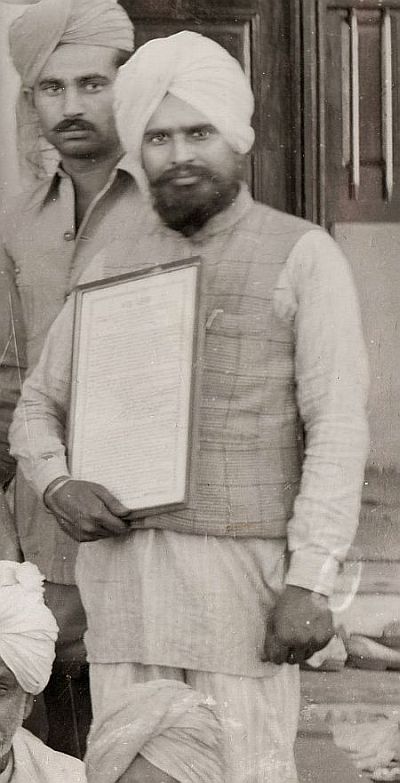
Pitaji as Pradhan Mantri i.e., General Secretary of the PEPSU Vaid Mandal. Holding the welcome address at the state level conference, March 9, 1952. Behind - Police Inspector Dharam Chand, City In charge Ahmedgarh.
Pitaji had actively involved himself in organising the Vaid Mandal movement in the State. He had worked tirelessly for the registration of Vaidyas under the new legislation. On the basis of his newly obtained qualifications, he was able to get a job in 1955 as a Vaidya in Government. Ayurvedic Dispensaries. He served on a small salary of those days for more than a decade. Then he resigned to resume his practice in the wake of deterioration in his father's health.
He started contributing articles, with references from the handwritten books of the family like the one interestingly named Mohtam Sahib and the rare works in the Gurmukhi script, to the prestigious journals of Ayurveda including Dhanvantri, Sachittar Ayurved, Ayurved Mahasammelam Patrika, etc.
He participated regularly in the National Conferences on Ayurveda. I witnessed one such Sammelan at Vithal Bhai Patel Bhawan in New Delhi in December 1974.
Apart from his multifarious scholarship, Pitaji had remarkable abilities for organisational matters and dealing with the governmental machinery. He enjoyed genuine friendships with activists of all political parties. He was at his best in the company of Sants and Mahants (saints and abbots) of great spiritual learning who were also quite wealthy and socially influential. It was a great privilege for me to enjoy listening discretely to their learned discourses.
Still, Father was quite clear and keen that I must excel in modern education. He seemed intuitively aware that I had my own path to traverse and avail the new opportunities in independent India. There was, to admit honestly, an unavoidable and unbridgeable generational gap between us. The back-breaking burdens of the family accumulated from his second marriage vitiated and soured the emotional bond between us. His health, with early signs of high blood pressure, had started deteriorating sharply with heart and diabetic conditions. He must have been fully aware of all his ailments and had started looking much older at the age fifty.
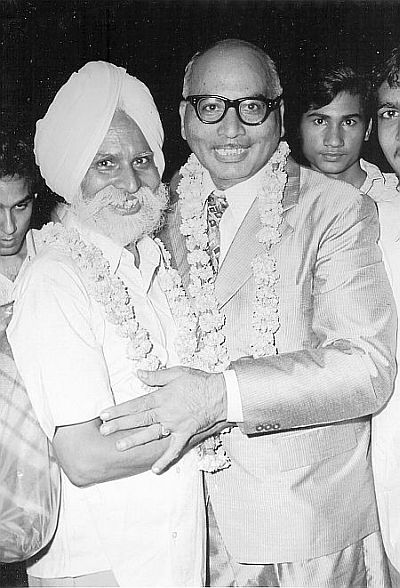
L to R: Pitaji, Nand Lal Ramdasia (my father-in-law) at my wedding, Aug 12, 1973
Behind L to R: V K Mangla (Bal Anand friend), Unidentified
I think that the occasion of my marriage in August 1973 was the most fulfilling moment for Pitaji.
The Akhand-path to celebrate the birth of his grandson on the Lohri of 1975 with Tikka Kuldeep Singh Bedi, a descendant of the Sikh Gurus, reciting the Granth Sahib was his greatest - and sadly the last - moment of celebration.
Father had become a very close friend of my father-in-law, Shri Nand Lal Ramdasia, an officer of the 1948 batch of the Indian Railway Traffic Service (IRTS). My father-in-law's sudden death in a suspicious medical accident-reaction to penicillin injection - on December 4, 1977 - completely shattered my father.
Father's demise within a period of less than five months was a big double shock for me but it was no surprise. While taking leave of him at the railway station of Ahmedgarh on 17th January 1978, I had an eerie and foreboding feeling that it was, perhaps, my last glimpse of him. I could piercingly fathom from his face and foresee in his eyes that light of his life might be fading fast.
On April 19, 2014 - the 36th death anniversary of Father - I chose to make a pilgrimage to the more than 170-year-old shrine of the family patriarch Baba Gajjan Shah Ji in our native village of Falaund Kalan. After prayers, I spent some time with Manohar, a childhood playmate who had lost his eyesight at the age of five years in an attack small pox. I requested Manohar to recite again my favourite Kabbit - fast rhymed poem with profuse alliteration - of Sant Gulab Das. I have written down the poem this time.
Then I chanced to come across an older person. I walked across to him and introduced myself in the name of my ‘Vaid' Father. He immediately extended his arms and embraced me tightly. He said, "I am Shah Nawaz Khan and I am now more than eighty years old. Your father Vaid Har Dayal Ji had saved my life sixty years ago when I was almost dying of persistent dysentery... he was the best Vaid of his time in the area!"
I surprised him by telling him that I remember having seen his father, Rattu Khan, a tall fellow who used to graze the goats of the village! And standing a few steps away from the sacred soil of the cremation of six generations of forefathers, I could not control the incessant and profuse flow of the tears of pride in my eyes, in the most pious memory my Father!
Epilogue
I spent my childhood years in a village. Later, I grew up in a town. Both of them were located close to Malerkotla, the only princely state in the East Punjab ruled for centuries by the Muslim Nawabs. So, I have been wondering and pondering since long about the harmonies and divides between Hindus and Muslims.
The small state of Malerkotla had remained comparatively immune from the mindless violence during the Partition of the country. I have a vivid memory of an inscription, intact in 1951 but decimated soon after, of the name of Nawab Iftikhar Ali Khan on the front wall of the Gurudwara in Ahmedgarh for his donation of Rs. 500.00. It must have been a princely sum in those days!
I had instinctively developed a faith in the mutual accommodation among faiths long before I was destined to be an Indian diplomat in Iran, Saudi Arabia, Pakistan and Maldives!
© Bal Anand 2016
Editor's note: The author received a number of comments, via email, from distinguished friends and former Indian Foreign Service colleagues. These comments are reproduced here.
Ambassador D K Jain
Thank you, dear Bal Anand, for sharing your family's intimate and inspiring details here, which made a most absorbing narrative. Knowing you for years now, I would say that you are indeed a chip of the old block.
Warmly,
Dinesh
Ambassador Prabhakar Menon
A soulful and heartfelt tribute, Bal Anand Bhai, and one that connects the "Bharat" of your earlier years with the "India" of your later career, neither exclusive of the other, both together an example of the composite, colourful country that you and I happened to represent abroad at one time, and now happen to live in, praise and criticize, love and chastise.
In the welter of conflicting cultural interpretations of our nationhood, one sometimes forgets that the old-style non-anglicized "native"---vernacular in speech, devout householder, conscientious citizen, scholar of Sanskrit, his learning the repository of our nation's traditions, his tolerance emblematic of its uniqueness---is as indispensable and worthwhile a symbol of India as his contemporary industrial, scientific, administrative or academic counterpart.
To claim that one is superior to the other is to devalue both.
Thank you for your nostalgic reminiscences!
Good wishes,
Prabhakar
Ambassador G. Parthasarathy
Dear Bal,
I was deeply touched to read what you have written about the life and times of your respected father.
You have written about the quality of your father of being a "uniquely engaging conversationalist". Allow me to take the liberty of saying that this is a quality his son has inherited. I can vouch for that, from the number of conversations we had during morning walks, when there was much I learnt from you of the religious, cultural and literary history of Punjab.
With warm regards,
G Parthasarathy
Ambassador S T Devare
Dear Bal Anand,
A very interesting and impressive autobiographical essay. My felicitations.
Best regards,
Sudhir Devare
Ambassador Amitava Tripathi
Dear Bal,
What a remarkable story and told with such simplicity, gentle humour, deep respect and unbounded love. You are truly the worthy eldest son of a great father, even if he seems from our current vantage point to have belonged to a clearly different era. What an amazing adventure India has been through in the span of a few generations!
Do keep presenting us with such gems. It would make us forget for a while at least all the banalities of our lives.
Amitava
Ambassador B K Shetty
Dear Bal Anandji,
Your essay was both deeply touching and powerfully insightful.
Your tribute to your father was also, at a deeper level, a tribute to our unique and rich Indian heritage. Each one of us, coming from many different parts of India, can relate to your experiences and attachments with something similar and yet, paradoxically, something quite different at the same time.
I refer to the diverse attributes of the Indian way of life - in the North or in the South, in the East or in the West- permeated by culture, religion and values of an honourable life, singularly unique in myriad different ways, and yet based on the accumulated ancient wisdom and tolerance, a melange of cultures - not just Hindu and Islam but also Christian, Sikh, Buddhist, Jain, Zoroastrian and other indigenous ones - and connecting with the past and yet reaching out to a new evolving India.
History has taught us that no civilization is perfect, yet paradoxically again, it appears to be a peculiarly Indian propensity to demean and dismiss our own heritage because of a few blemishes, as some of our compatriots seem inclined to do, which is like insulting and rejecting our parents just because they have warts!
Thank you for the wonderful essay.
With warm regards,
Balkrishna Shetty
Ambassador Ravi Nilkantan
Dear Bal Anand,
A very moving and inspiring account of your father's journey amidst us. You have summed up the piece nicely by reflecting faith in two planes. A father's faith in his son and the son's faith that faiths can flourish together.
Your piece was a throwback to times that were steady and sedate. After reading your tribute, one feels that time, then, moved at an agreeable and pleasant pace so that we could commune with everyone and everything around us. These days, things are decidedly different.
Many thanks for taking us back to days that were simple and straightforward.
Good wishes,
Sincerely,
Ravi
Ambassador Surendra Kumar
Bal Bhai,
Compliments and kudos have been pouring in since you posted your auto-graphical essay &\; you richly deserve them all. I too add my bit, I was busy with IAFA event till last evening so, wasn't as nimble footed as other admirers of yours. Nonetheless, I convey my warm congrats.
The fact remains that in most cases, a huge credit for what we are today goes to our parents.
Regards, Surendra.
Ambassador PS Sahai
Dear Bal,
Let me join Partha in paying tribute to your father for his scholarship, which is more about values and qualities than pure academics. I notice your deep knowledge of culture and heritage in your writings. Pl keep up your passion for writing, as this is the best and everlasting tribute that you can pay to your father. Today, I bumped in to P S Gill and we both remembered you.
Paramjit Sahai
Ambassador BS Prakash
Dear Bal Anand bhai,
I join others who found your writing evocative and sweet. Our evening 'addas' in Mayur Vihar - before you decided to shift to 'Greater' locales - had already given me a glimpse of your many interests and belief in our many faiths. Your profile of your father shows the early influences in your own evolution.
Warmly,
B S Prakash
Ambassador Smt Mitra Vasisht
Dear Shri Bal Anandji,
I loved your beautifully written auto-bio piece. You may not recall but you were one of the first officers I worked with on joining the IFS. I was designated Attaché WANA and given a desk attachment in lieu of Mussoorie Foundational which I had already done as an IPS probationer. We shared a room with two others in South Block. Your gentle, polished demeanour had made a deep impression on me, since fortified by your consistently measured, weighty and educative posts. The account of your father has touched me deeply and provided a glimpse into the making of your gentle and philosophic persona.
With warm personal regards,
Mitra Vasisht
Ambassador Jagjit S Sapra
Dear Bal Anandji,
Truly a moving autobiography. My all good wishes to you and family as we remember and cherish a life of your Pitaji -- who lived his life for the betterment of humanity
With regards,
J.S. Sapra
Shri Y K Sinha -currently High Commissioner in Colombo
Dear Sir,
What a wonderfully evocative and sentimental tribute to your father!
Warm regards,
Yash Sinha
Ambassador T P Srinivasan
Thank you, Bal, for this charming story about your dad.
Many of us can relate to the events in your early life, but we tend to pride in our accomplishments to the neglect of the dreams and sacrifices of our parents. Like in the case of Barack Obama, many of our autobiographies could be titled, "My Father's Dream".
Sincerely,
Sreeni
Ambassador SK Lambah
(former HC in Pakistan, Ambassador to Germany / Russia / Special Envoy of Prime Minister...I was his Deputy High Commissioner in Islamabad)
Dear Bal,
What a pleasure it was to read your account of your illustrious father. It is good that you have put your thoughts on paper. Knowing you I can say that you have inherited his qualities.
Nina joins me in sending you and the family our good wishes.
Satinder K. Lambah
Comments
Your Auto-biographical essy
Add new comment